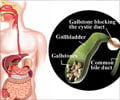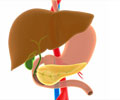Researchers have been trying for a long time to properly analyze the symptoms of gallbladder disease so that diagnosis is made easy.
Researchers have been trying for a long time to properly analyze the symptoms of gallbladder disease so that diagnosis is made easy.
Primary sclerosing cholangitis (PSC) is an idiopathic chronic cholestatic inflammatory liver disease characterized by diffuse fibrosing inflammation of intra- and/or extrahepatic bile ducts, resulting in bile duct obliteration, biliary cirrhosis, and eventually hepatic failure. One of the most common symptoms at the time of presentation of PSC is mild to severe abdominal pain localized in the right upper quadrant. However, the mechanisms responsible for the abdominal pain in PSC are not fully understood.A research team led by Karouk Said from Karolinska University Hospital addressed this question. Their study will be published on July 28, 2009 in the World Journal of Gastroenterology.
In this study, 20 patients with PSC and 10 healthy subjects were investigated. Gallbladder fasting volume, ejection fraction and residual volume after ingestion of a test meal were compared in patients with PSC and healthy controls using magnetic resonance imaging. Symptoms, thickness and contrast enhancement of the gallbladder wall and the presence of cystic duct strictures were also assessed.
Median fasting gallbladder volume in patients with PSC [67 (19-348) mL] was twice that in healthy controls [32 (16-55) mL] (P < 0.05). The median postprandial gallbladder volume in patients with PSC was significantly larger than that in healthy controls (P < 0.05). There was no difference in ejection fraction, gallbladder emptying volume or mean thickness of the gallbladder wall between PSC patients and controls. Contrast enhancement of the gallbladder wall in PSC patients was higher than that in controls; (69% ± 32%) and (42% ± 21%) (P < 0.05). No significant association was found between the gallbladder volumes and occurrence of abdominal pain in patients and controls.
This concluded that PSC patients have increased fasting gallbladder volume. Gallbladder mucosal dysfunction secondary to chronic cholecystitis, may be a possible mechanism for increased gallbladder volume. Gallbladder size or emptying does not seem to be involved in the development of abdominal pain in patients with PSC.
RAS
 MEDINDIA
MEDINDIA




 Email
Email









